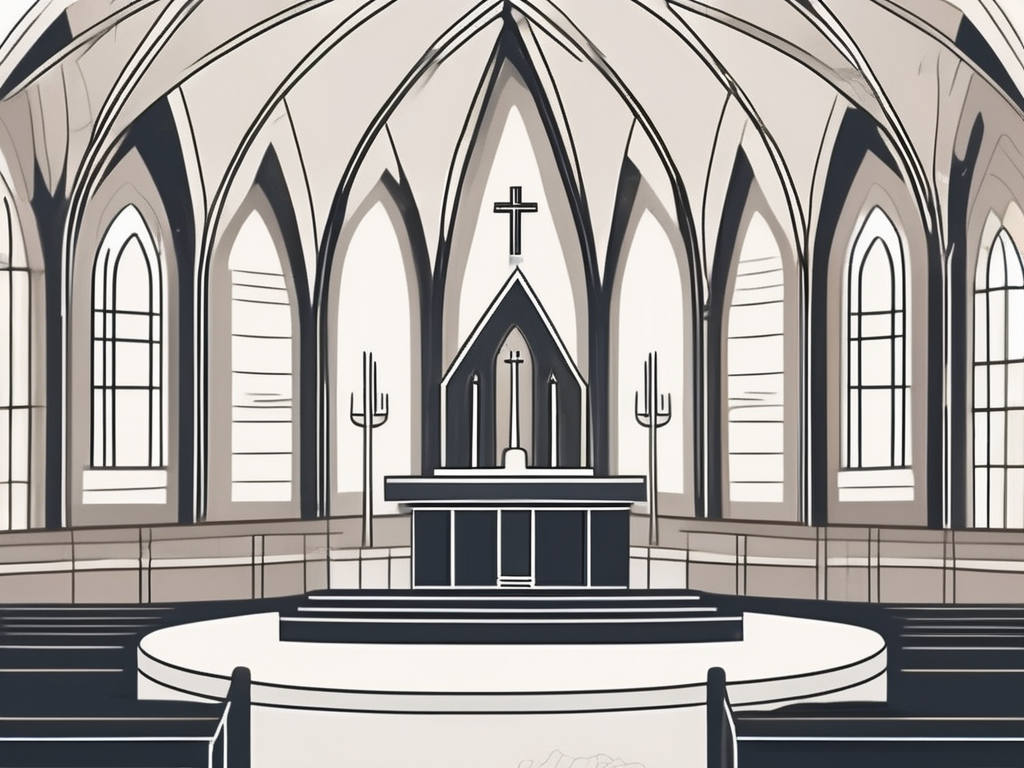In recent years, a new trend has emerged among believers and non-believers alike: the deconstruction of Christianity. This process, often misunderstood and even feared, involves the examination and questioning of deeply held beliefs, leading to a search for truth and personal meaning. Let’s explore the concept of deconstruction, its philosophy, and its implications for individuals, society, and the future of Christianity.
Understanding the Concept of Deconstruction
At its core, deconstruction is a philosophical approach that aims to challenge and dismantle fixed meanings and interpretations. It recognizes that language and symbols are not fixed, but rather fluid and open to multiple interpretations. Applied to Christianity, deconstruction involves questioning traditional doctrines, interpretations, and practices in order to explore greater understanding and personal growth.
The Philosophy Behind Deconstruction
In deconstruction, the focus is not on absolute truths or definitive answers, but on the fluidity and complexity of human experiences. It encourages a critical examination of assumptions and biases that shape our beliefs, allowing for a more nuanced understanding of spirituality and faith.
When engaging in deconstruction, individuals are encouraged to question the fixed meanings and interpretations that have been imposed upon them. This process involves examining the underlying assumptions and biases that have shaped their beliefs and challenging them in order to gain a deeper understanding of themselves and the world around them.
By deconstructing fixed meanings and interpretations, individuals are able to explore alternative perspectives and embrace the idea that there is no single “correct” way to understand or interpret a concept. This opens up a world of possibilities and allows for personal growth and development.
Deconstruction in the Context of Christianity
Within the context of Christianity, deconstruction challenges the often rigid and dogmatic nature of religious beliefs. It invites believers to question inherited beliefs and interpretations, seeking a more authentic and personal relationship with God.
Deconstruction in Christianity is not about rejecting or abandoning one’s faith, but rather about critically examining and reevaluating the beliefs and practices that have been handed down. It encourages individuals to explore their own understanding of spirituality and faith, rather than relying solely on the interpretations of others.
Through the process of deconstruction, individuals may find that their faith becomes more dynamic and alive, as they engage in a personal journey of exploration and discovery. This can lead to a deeper connection with God and a greater sense of purpose and meaning in their spiritual lives.
It is important to note that deconstruction is not a one-size-fits-all approach. Each individual’s journey of deconstruction will be unique, as it is shaped by their own experiences, beliefs, and questions. It is a deeply personal and introspective process that requires courage and a willingness to challenge deeply ingrained beliefs.
Ultimately, deconstruction in the context of Christianity offers believers the opportunity to embrace a more authentic and personal faith, one that is not bound by rigid interpretations or dogma. It encourages individuals to engage in a continuous process of growth and self-discovery, as they navigate the complexities of spirituality and seek a deeper understanding of their relationship with God.
The Process of Deconstructing Christianity
Deconstructing Christianity is a deeply personal and unique journey for each individual. It involves a series of steps, beginning with the identification of core beliefs.
Identifying Core Beliefs
Before questioning and challenging beliefs, it is crucial to identify what those beliefs are. This requires introspection and reflection on one’s own faith journey, examining the foundational principles upon which Christianity is built.
When identifying core beliefs, individuals may find themselves reflecting on the teachings of Jesus, the authority of the Bible, the nature of God, and the purpose of human existence. They may consider the concepts of sin, salvation, and the afterlife. This process often involves deep contemplation and soul-searching, as individuals strive to understand their own personal convictions and the values that underpin their faith.
Moreover, identifying core beliefs may also involve examining the cultural and societal influences that have shaped one’s understanding of Christianity. This can include the teachings of religious leaders, the traditions of a particular denomination, or the values of one’s community. By recognizing these external influences, individuals can gain a clearer understanding of their own beliefs and discern which aspects of their faith are truly essential to their spiritual journey.
Questioning and Challenging Beliefs
Once core beliefs are recognized, deconstruction involves taking an honest and critical look at them. It involves asking difficult questions, exploring doubts, and seeking alternative perspectives. This process can be unsettling and uncomfortable, but it is an essential step towards personal growth and spiritual maturity.
During the questioning and challenging phase, individuals may find themselves grappling with various theological and philosophical dilemmas. They may question the existence of God, the problem of evil, or the compatibility of science and faith. They may also confront the inconsistencies or contradictions they perceive within religious texts or teachings.
Furthermore, this process often involves engaging with diverse perspectives and engaging in dialogue with others who may hold different beliefs or worldviews. By doing so, individuals can broaden their understanding and gain new insights that challenge their preconceived notions. This can lead to a deeper appreciation for the complexity of faith and a more nuanced understanding of one’s own beliefs.
It is important to note that the process of questioning and challenging beliefs does not necessarily mean abandoning one’s faith altogether. Rather, it is an opportunity for individuals to critically examine their beliefs, refine their understanding, and develop a more authentic and resilient faith.
In conclusion, deconstructing Christianity is a transformative journey that involves identifying core beliefs and questioning them with honesty and openness. It is a process that requires courage, humility, and a willingness to embrace uncertainty. Through this process, individuals can deepen their understanding of their own faith and cultivate a more authentic and meaningful spiritual journey.
The Impact of Deconstruction on Individual Faith
Deconstructing Christianity has profound effects on an individual’s faith journey, both emotionally and spiritually. It goes beyond the surface-level acceptance of religious teachings and delves into the depths of one’s beliefs, challenging long-held assumptions and inviting a critical examination of faith.
When embarking on the path of deconstruction, individuals often find themselves confronted with a myriad of emotions. Questioning deeply held beliefs can trigger a range of feelings, including doubt, fear, and even a sense of loss. It requires individuals to confront their vulnerabilities and wrestle with uncertainty. The process can be emotionally intense, as the very foundations of one’s faith are shaken.
However, amidst the emotional turmoil, deconstruction also offers the potential for personal liberation. By allowing individuals to authentically explore their doubts and uncertainties, it opens the door to a more resilient faith. Through this process, individuals have the opportunity to develop a deeper understanding of themselves and their relationship with spirituality.
Emotional and Psychological Effects
As individuals engage in the deconstruction of their faith, they embark on a journey of self-discovery. This journey often involves facing difficult questions and grappling with existential concerns. The emotional and psychological effects of deconstruction can be profound, as individuals navigate through the complexities of their beliefs and confront the limitations of their previous understanding.
During the process of deconstruction, individuals may experience moments of doubt. Doubt can be unsettling, as it challenges the certainty that once provided comfort and stability. It can evoke feelings of unease and anxiety, as individuals question the very essence of their faith. However, it is through this doubt that individuals have the opportunity to deepen their understanding and strengthen their beliefs.
Moreover, deconstruction can also lead to a sense of fear. Fear of the unknown, fear of losing one’s faith entirely, and fear of being ostracized by one’s religious community. These fears can be overwhelming, as individuals grapple with the potential consequences of their deconstruction. However, it is important to recognize that fear is a natural part of the process, and it can ultimately lead to personal growth and a more authentic faith.
Changes in Personal Spirituality
Deconstruction often leads individuals to reconstruct their faith in a way that is more congruent with their personal experiences and current understanding of the world. It is a process of shedding old beliefs and embracing new perspectives. This journey of reconstruction involves embracing ambiguity, engaging in ongoing spiritual growth, and integrating new ideas into one’s evolving faith.
Through deconstruction, individuals have the opportunity to explore different theological frameworks and philosophies. They may discover new perspectives that resonate with their own experiences and values. This exploration can lead to a deepening of personal spirituality, as individuals integrate these new ideas into their evolving belief systems.
Furthermore, deconstruction invites individuals to embrace ambiguity. It encourages them to acknowledge the complexities and uncertainties of faith, rather than seeking simplistic answers. This embrace of ambiguity allows for a more nuanced and multifaceted understanding of spirituality, fostering a sense of intellectual and spiritual growth.
In conclusion, the impact of deconstruction on individual faith is far-reaching. It challenges individuals to confront their vulnerabilities, navigate through a range of emotions, and reconstruct their faith in a way that is more congruent with their personal experiences and current understanding of the world. While the process can be emotionally and psychologically intense, it offers the potential for personal liberation and a more resilient faith.
The Societal Implications of Deconstructing Christianity
The impacts of deconstruction extend beyond the individual, encompassing church communities and wider society.
Deconstruction, as a process of critically examining and questioning traditional beliefs, has the potential to create significant effects on church communities. When individuals within a church begin to deconstruct their faith, it can lead to tension and conflict within the community. Some members may be resistant to change, clinging to long-held beliefs and traditions, while others may feel uncomfortable with the idea of questioning their faith. This tension can create a divide within the church, with differing factions emerging.
However, deconstruction can also foster a climate of openness and inclusivity within church communities. It provides a space for individuals to share their doubts and explore new ideas without fear of judgment or rejection. This climate of openness can lead to meaningful discussions and a deeper understanding of one’s faith. It can also create a sense of community among those who are going through similar journeys of deconstruction, providing support and encouragement.
Furthermore, the effects of deconstruction extend beyond church communities and into broader cultural and social implications. As deconstruction challenges the status quo and questions traditional beliefs, it has the potential to influence cultural and social conversations. It can contribute to a more critical examination of religious institutions, prompting dialogue and necessary reforms.
Deconstruction can lead to a reevaluation of the role of religion in society, sparking discussions about the intersection of faith and social issues. It can inspire individuals to question the ways in which religious institutions may perpetuate harmful ideologies or contribute to social injustices. This critical examination can pave the way for necessary reforms within religious institutions, promoting inclusivity, social justice, and equality.
Moreover, deconstruction can also impact the wider society by challenging deeply ingrained beliefs and norms. It encourages individuals to think critically about the world around them, questioning societal structures and systems. This critical thinking can lead to a more informed and engaged citizenry, fostering a society that is open to change and willing to challenge oppressive systems.
In conclusion, the process of deconstructing Christianity has far-reaching implications for both church communities and wider society. While it can create tension within church communities, it also has the potential to foster a climate of openness and inclusivity. Moreover, deconstruction can influence broader cultural and social conversations, prompting a critical examination of religious institutions and societal norms. By encouraging individuals to question and challenge traditional beliefs, deconstruction can lead to necessary reforms and a more engaged and informed society.
The Future of Christianity in Light of Deconstruction
Deconstruction presents both challenges and opportunities for the future of Christianity.
Potential Paths for Reconstructing Faith
Deconstruction does not necessarily lead to the abandonment of Christianity. Instead, it allows for the reconstruction of faith based on personal insights and experiences. Many individuals find solace in embracing a more inclusive, tolerant, and intellectually honest spirituality.
The Role of Doubt and Uncertainty in Spiritual Growth
Deconstruction highlights the value of doubt and uncertainty as catalysts for spiritual growth. It acknowledges that faith is not stagnant, but rather an ongoing process of seeking truth in an ever-evolving world.
In conclusion, deconstructing Christianity offers individuals a pathway to personal growth, authenticity, and a deeper understanding of spirituality. It challenges long-held beliefs, encourages critical reflection, and fosters a more inclusive and vibrant faith experience. While the process may be unsettling, it opens doors to a more resilient and transformative faith, shaping both individuals and the future of Christianity as a whole.












